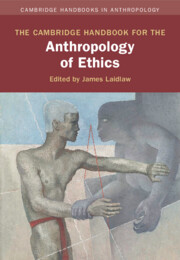Book contents
- The Cambridge Handbook for the Anthropology of Ethics
- Cambridge Handbooks in Anthropology
- The Cambridge Handbook for the Anthropology of Ethics
- Copyright page
- Contents
- Contributors
- 1 Introduction
- Part I Intellectual Sources and Disciplinary Engagements
- Part II Aspects of Ethical Agency
- 9 Making the Ethical in Social Interaction
- 10 Freedom
- 11 Responsibility
- 12 Emotion and Affect
- 13 Happiness and Well-Being
- 14 Suffering and Sympathy
- 15 Ambiguity and Difference
- Part III Media and Modes of Ethical Practice
- Part IV Intimate and Everyday Life
- Part V Institutional Life
- Index
- References
12 - Emotion and Affect
from Part II - Aspects of Ethical Agency
Published online by Cambridge University Press: 11 May 2023
- The Cambridge Handbook for the Anthropology of Ethics
- Cambridge Handbooks in Anthropology
- The Cambridge Handbook for the Anthropology of Ethics
- Copyright page
- Contents
- Contributors
- 1 Introduction
- Part I Intellectual Sources and Disciplinary Engagements
- Part II Aspects of Ethical Agency
- 9 Making the Ethical in Social Interaction
- 10 Freedom
- 11 Responsibility
- 12 Emotion and Affect
- 13 Happiness and Well-Being
- 14 Suffering and Sympathy
- 15 Ambiguity and Difference
- Part III Media and Modes of Ethical Practice
- Part IV Intimate and Everyday Life
- Part V Institutional Life
- Index
- References
Summary
This chapter argues for the relevance of emotion and affect to the anthropology of ethics. It begins with a discussion of philosophers who take emotion seriously as an area of human life that exposes the limits of ethical inquiry, so as to establish emotion as a relation in which something is at stake in a first-person way. With this understanding, the chapter goes on to highlight how classic studies in the anthropology of emotion depicted local moral worlds, relating emotion to the pragmatics of social life and its many problems. A certain strand of affect theory is then brought to bear to make the key formulation more robust by accommodating a broader multiplicity of relations of interest and passion. This discussion highlights the way ethnography – as a genre of writing – can capture a pile-up of affects in unique historical circumstances, revealing how moral agency and states of depression may be found together. Vitalist in spirit, the chapter aims to show how a focus on emotion and affect illuminates a moral agent defined by her vulnerability and responsiveness to matters at stake in the web of relations that constitutes her world.
- Type
- Chapter
- Information
- The Cambridge Handbook for the Anthropology of Ethics , pp. 309 - 334Publisher: Cambridge University PressPrint publication year: 2023



